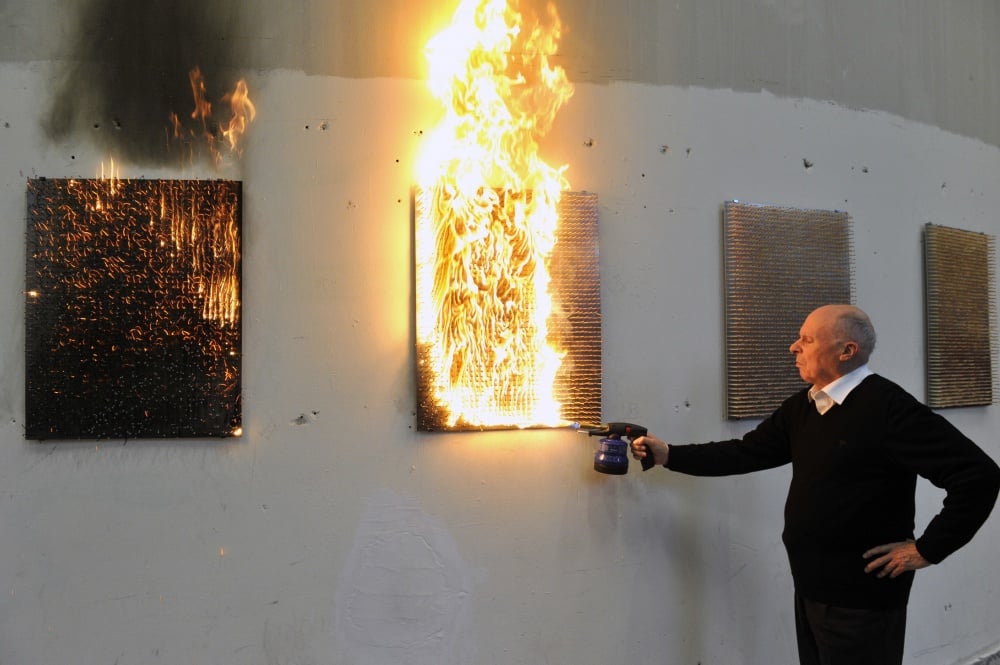The Evolution Of Landscape In David Hockney's "A Bigger Picture"

Table of Contents
Hockney's Early Landscape Paintings: A Foundation for "A Bigger Picture"
Hockney's early landscapes laid the groundwork for the ambitious project that is "A Bigger Picture." His early works, primarily from the 1950s and 60s, already displayed a keen eye for detail and a fascination with capturing the essence of a place. These paintings, often depicting the Yorkshire countryside or the Californian landscape, reveal a developing understanding of perspective and color.
- Use of Color and Perspective: Hockney's early works demonstrate a growing mastery of perspective, moving from relatively traditional representations to more experimental compositions. His use of color is often bold and expressive, reflecting the vibrant hues of the natural world. Think of his early depictions of swimming pools, showcasing a unique perspective on the ordinary.
- Impact of Location: The landscapes of Yorkshire, with its rolling hills and distinct seasons, heavily influenced his early style, contrasting sharply with the bright, sun-drenched scenes of California which later became a major subject. This geographical shift profoundly impacted his approach to color and light.
- Specific Early Works: Paintings such as "A Rake's Progress" (a series) and early Yorkshire landscapes showcase his developing style and provide a valuable context for understanding the evolution of his artistic approach. These early pieces demonstrate a foundation in traditional techniques that he would later build upon.
- Connecting Early and Later Styles: The meticulous observation evident in his early works forms the bedrock of his later, more complex, and technologically influenced landscape paintings, showcasing a continuous thread of dedication to capturing the subtleties of the natural world.
The Shift to Photo-Based and Multi-Panel Works in "A Bigger Picture"
"A Bigger Picture" marks a pivotal shift in Hockney's artistic approach. He abandoned traditional single-canvas paintings in favor of a revolutionary multi-panel format, often incorporating photographic elements. This transition reflects a desire to capture a more expansive and dynamic view of the landscape.
- Adoption of Photo Collages: Hockney's embrace of photo collage wasn't merely an aesthetic choice; it was a strategic move. By using photography, he could capture fleeting moments and perspectives impossible to achieve with solely paint. This method allowed for a more accurate and detailed representation of the subject matter.
- Impact of Multiple Panels: The use of multiple panels transforms the viewer's experience. Instead of a single viewpoint, the multi-panel works encourage movement and exploration, mirroring the shifting perspectives we encounter in real life. The viewer becomes an active participant in experiencing the artwork.
- Representation of Time and Movement: The multi-panel structure effectively represents the passage of time and the fluidity of the landscape. Hockney's juxtapositions of different perspectives and moments create a dynamic and evolving image, bringing a sense of temporal depth to the work.
- Integration of Photography: Photography, for Hockney, wasn't a replacement for painting but a powerful tool. It allowed him to gather visual information – capturing light, shadow, and perspective – which he then translated into his multi-panel masterpieces. This integration represents a crucial aspect of David Hockney's landscape evolution.
Capturing Light and Movement: A Defining Characteristic of Hockney's Landscape Evolution
Throughout his career, Hockney’s work has been defined by his ability to capture the ephemeral nature of light and movement in the landscape. This skill is particularly evident in "A Bigger Picture."
- Impact of the Seasons: The changing seasons play a significant role in Hockney's landscape depictions. He masterfully captures the subtle shifts in light and color, showcasing the dynamism of the natural world across different times of year.
- Fluidity of Water and Other Elements: Hockney's paintings beautifully capture the movement of water, the rustling of leaves, and the subtle shifts in atmospheric conditions. His skill lies in conveying the energy and vitality of nature.
- Use of Color to Express Dynamism: Color serves as a powerful tool in conveying the dynamic nature of the landscape. Hockney's vibrant palette creates a sense of energy and movement, enriching his depiction of the ever-changing environment.
- Comparing Early and Later Techniques: Comparing Hockney’s early, more traditional landscapes to his later, photo-influenced works highlights the evolution of his techniques in depicting light and movement. His later pieces show a greater emphasis on capturing the fleeting moments of light and shadow.
The Impact of Technology on Hockney's Depiction of Landscape
The integration of technology, particularly photography and iPad drawing, significantly influenced Hockney's artistic evolution and his representation of landscape.
- Transition to Digital Technology: Hockney seamlessly transitioned from traditional painting techniques to incorporating digital technology. His use of the iPad allowed for greater experimentation and speed in capturing and processing visual information.
- Benefits of New Technology: The use of technology provided Hockney with new tools to observe and record landscape details, enhancing his ability to capture subtle shifts in light, perspective and movement.
- Enhanced Detail and Perspectives: Technology allowed Hockney to achieve a greater level of detail and to explore perspectives previously inaccessible through traditional means, expanding the possibilities within his artistic expression.
- Influence on "A Bigger Picture": The influence of technology is readily apparent in the innovative techniques and multi-panel format of "A Bigger Picture," allowing for a uniquely holistic and dynamic perspective on landscape.
Conclusion
David Hockney’s "A Bigger Picture" represents a significant evolution in his approach to landscape painting, demonstrating his mastery of diverse techniques and his engagement with technological advancements to capture the ever-changing beauty and dynamics of the natural world. His innovative use of photo collage and multi-panel works revolutionized the way we perceive landscape representation in art. His journey showcases a continuous exploration of how to best capture the essence of a landscape, a testament to his dedication to his craft and his enduring legacy. To further explore the profound impact of Hockney's unique perspective on landscape evolution, delve deeper into the artistic details of "A Bigger Picture" and witness the transformation of his artistic vision. Understanding David Hockney's landscape evolution provides a deeper appreciation for his artistic legacy and its impact on the art world.

Featured Posts
-
 Annie Kilners Diamond Ring Confirmation Of Kyle Walker Relationship
May 25, 2025
Annie Kilners Diamond Ring Confirmation Of Kyle Walker Relationship
May 25, 2025 -
 The Hells Angels An Examination Of Their Influence And Power
May 25, 2025
The Hells Angels An Examination Of Their Influence And Power
May 25, 2025 -
 Muere Eddie Jordan Ultima Hora
May 25, 2025
Muere Eddie Jordan Ultima Hora
May 25, 2025 -
 News Corp Undervalued And Underappreciated Analyzing The Current Market Position
May 25, 2025
News Corp Undervalued And Underappreciated Analyzing The Current Market Position
May 25, 2025 -
 Philips Announces 2025 Annual General Meeting Of Shareholders Agenda And Important Information
May 25, 2025
Philips Announces 2025 Annual General Meeting Of Shareholders Agenda And Important Information
May 25, 2025
